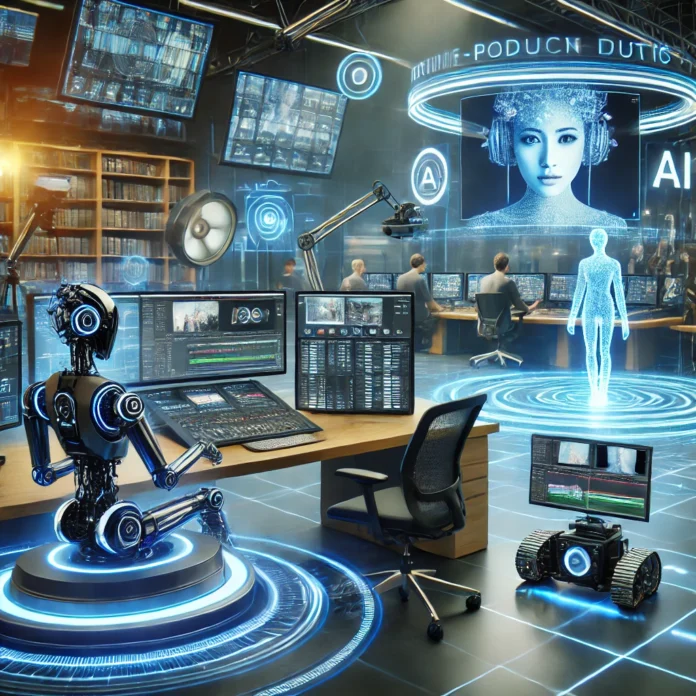Artificial Intelligence (AI) is transforming the film industry, reshaping how movies are written, produced, edited, and even performed. From AI-generated scripts to deepfake technology and automated video editing, AI is pushing the boundaries of creativity while streamlining the filmmaking process.
AI in Scriptwriting and Storytelling
AI-powered tools are now assisting writers by generating story ideas, improving scripts, and even predicting audience engagement. Algorithms analyze successful movie scripts to suggest improvements in plot structure, dialogue, and character development.
- AI scriptwriting tools like OpenAI’s GPT-4 can create compelling narratives based on a given prompt, providing filmmakers with fresh ideas.
- Warner Bros. partnered with Cinelytic, an AI-driven platform, to analyze scripts and predict a film’s potential success before production begins.
Although AI cannot yet replace human creativity, it acts as a powerful co-writer, helping filmmakers refine their ideas and reduce development time.
AI-Generated Visual Effects (VFX) and CGI
AI is revolutionizing visual effects by making CGI (computer-generated imagery) more realistic and cost-effective. Traditional VFX techniques require extensive manual work, but AI can automate processes like motion capture, background rendering, and object removal.
- Deepfake technology allows filmmakers to digitally de-age actors or even resurrect deceased ones, as seen in movies like Rogue One: A Star Wars Story (where AI recreated Peter Cushing’s likeness as Grand Moff Tarkin).
- AI-driven de-aging was also used in The Irishman, allowing Robert De Niro and Al Pacino to play their characters across multiple decades.
- Generative AI tools like NVIDIA’s GANs (Generative Adversarial Networks) help create photorealistic backgrounds and characters without expensive green-screen techniques.
AI in Editing and Post-Production
Editing is one of the most time-consuming aspects of filmmaking, but AI-powered tools are now automating parts of the process. AI algorithms can analyze footage, detect key scenes, and even suggest edits based on pacing, lighting, and narrative flow.
- Adobe Sensei AI helps automate video editing by identifying the best shots, improving color correction, and even removing unwanted objects from scenes.
- IBM Watson AI was used in the editing process of the horror movie Morgan, creating a suspenseful trailer by analyzing thousands of previous thriller trailers.
With AI’s ability to detect emotions and engagement levels in audiences, filmmakers can create more immersive storytelling experiences.
AI-Powered Animation and Virtual Actors
AI-driven animation tools are making it easier for filmmakers to create lifelike animated characters. Machine learning algorithms analyze real human movements and replicate them in animation, reducing the need for manual frame-by-frame work.
- AI-powered motion capture, used in movies like Avatar and The Lion King (2019), helps create realistic character animations.
- AI-generated virtual actors are emerging, raising ethical debates about replacing human performers with digital doubles.
AI and Personalized Film Experiences
Streaming platforms like Netflix and Disney+ already use AI to recommend content, but AI is taking personalization further by enabling interactive storytelling.
- Netflix’s Black Mirror: Bandersnatch used AI-based branching narratives, allowing viewers to choose the storyline.
- AI could soon enable hyper-personalized movies, where a film adapts in real-time based on a viewer’s preferences.
Challenges and Ethical Concerns
While AI is revolutionizing filmmaking, it raises critical concerns:
- Job Displacement: AI automation may reduce the demand for human editors, VFX artists, and scriptwriters.
- Deepfake Misuse: AI-generated deepfakes can be used for misinformation or unauthorized recreations of actors.
- Creativity vs. Automation: Can AI truly match the depth and emotional intelligence of human storytellers?
The Future of AI in Filmmaking
AI is not here to replace filmmakers but to enhance their creative capabilities. In the coming years, we may see AI-generated movies, fully virtual actors, and films that evolve based on audience reactions. As AI continues to evolve, it will redefine storytelling, making filmmaking more efficient, immersive, and accessible.
The fusion of human creativity and AI-driven innovation is shaping the future of cinema—where imagination meets technology like never before.





